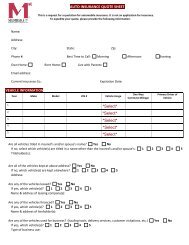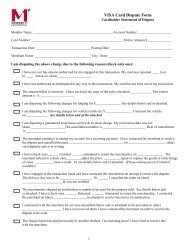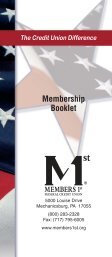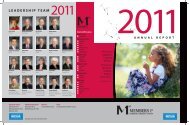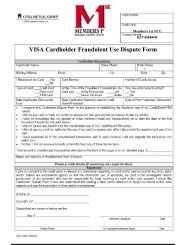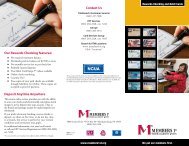Discover - Members 1st Federal Credit Union
Discover - Members 1st Federal Credit Union
Discover - Members 1st Federal Credit Union
Create successful ePaper yourself
Turn your PDF publications into a flip-book with our unique Google optimized e-Paper software.
Do you offer any loan<br />
protection services in case I<br />
lose my job?<br />
Member Value Protection gives<br />
you the peace of mind of knowing<br />
that your monthly loan payments<br />
will be cancelled in the event of<br />
death, disability or involuntary<br />
unemployment. Your consumer loan<br />
payment will be cancelled without<br />
penalty, added interest, or being<br />
reported as delinquent to the credit<br />
bureau. Ask your Loan Officer for<br />
details when you apply for your loan.<br />
What if I get transferred, leave<br />
my current job or have to<br />
move out of the immediate<br />
service area? Can I keep my<br />
account(s)?<br />
Once a member, always a member.<br />
Because we have extensive electronic<br />
and mobile services, you can use our<br />
services from anywhere in the world.<br />
We’re accessible by phone, mail,<br />
computer, mobile device or an ATM.<br />
What do you offer for small<br />
businesses?<br />
We offer a full line of loan and deposit<br />
products and services to assist<br />
the small business community of<br />
Southcentral Pennsylvania. For specific<br />
information, go to www.members<strong>1st</strong>.<br />
org, and click “Products & Services,”<br />
followed by “Business Services.” We also<br />
offer commercial insurance.<br />
If I apply for a loan, how fast<br />
will I get an answer?<br />
We can give you an answer in less than<br />
15 minutes on most loans.<br />
What’s the difference<br />
between <strong>Members</strong> <strong>1st</strong><br />
and a bank?<br />
While both credit unions and banks may offer similar products and services (checking,<br />
credit cards, mortgages, etc.), there are differences in how each type of financial<br />
institution operates. Here are the major differences:<br />
Banks<br />
Generate profit for stockholders. Make<br />
decisions based on what will give<br />
stockholders more profit.<br />
Commercial businesses. Offer services to<br />
make a profit.<br />
People who buy stock in the bank own<br />
shares of the business.<br />
Serve customers from the general<br />
public. Anyone can use a bank.<br />
The Board of Directors are paid a salary.<br />
Daily operations are performed by a<br />
paid staff.<br />
Only people who own stock can vote for<br />
the Board of Directors. The customers<br />
who use the bank don’t have a say.<br />
Income is returned to the stockholders<br />
in the form of higher dividends on their<br />
shares of stock.<br />
Like other for-profit businesses, banks<br />
must pay taxes to the government.<br />
Deposits are federally insured up to<br />
$250,000 by the FDIC, a government<br />
agency.<br />
<strong>Credit</strong> <strong>Union</strong>s<br />
Not for profit, not for charity, but for<br />
service. Without a “profit motive,” we<br />
make decisions based on what’s best for<br />
our members.<br />
Financial cooperatives. <strong>Members</strong> pool<br />
their savings to provide low-cost loans<br />
and low-fee services to each other.<br />
Each member is an equal owner.<br />
Exist solely to serve their members. A<br />
person must be within the credit union’s<br />
field of membership, as defined by their<br />
charter, in order to join.<br />
Unpaid volunteers from the<br />
membership serve on the Board of<br />
Directors and guide the credit union.<br />
Daily operations are performed by a<br />
paid staff.<br />
As owners, members elect fellow<br />
members to serve on the Board of<br />
Directors.<br />
Income is returned to members in the<br />
forms of better savings rates, lower loan<br />
rates, and low or no fees for services.<br />
Like other not-for-profit institutions,<br />
credit unions are exempt from paying<br />
federal income tax.<br />
Deposits are federally insured up<br />
to $250,000 by the National <strong>Credit</strong><br />
<strong>Union</strong> Administration, a government<br />
agency. The NCUA’s insurance fund<br />
is the healthiest of all federal deposit<br />
insurance funds.<br />
We Put Our <strong>Members</strong> First. www.members<strong>1st</strong>.org 5



